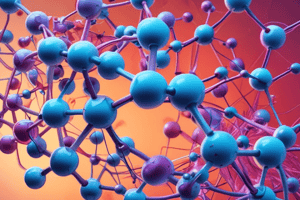Podcast
Questions and Answers
What is the role of catalysts in organic chemistry reactions?
What is the role of catalysts in organic chemistry reactions?
Catalysts speed up the rate of chemical reactions and make them more selective.
Describe electrophilic substitution in organic chemistry.
Describe electrophilic substitution in organic chemistry.
Electrophilic substitution involves an electrophile attacking a substituent group on an aromatic ring.
How do reduction and oxidation reactions impact molecules in organic chemistry?
How do reduction and oxidation reactions impact molecules in organic chemistry?
Reduction and oxidation reactions involve the addition or removal of electrons, changing the oxidation state and properties of molecules.
What are some applications of organic chemistry in the industry?
What are some applications of organic chemistry in the industry?
What are some examples of organic chemistry applications in energy production?
What are some examples of organic chemistry applications in energy production?
Study Notes
Cracking the Code: A Deep Dive into Organic Chemistry
Organic chemistry is the lifeblood of the natural world, where the intricate dance of carbon atoms forms the basis for the molecules we see all around us – from the aroma of a flower to the medicines we take to heal. In this exploration, we'll dive into the intriguing realm of organic chemistry, examining the principles and applications that make it a fascinating field of study.
Carbon's Chemical Charisma
The unique ability of carbon to form strong covalent bonds with itself and other elements is the essence of organic chemistry. Carbon's remarkable versatility allows it to form vastly different structures, many of which have profound effects on living organisms and the environment.
The Language of Chemistry: Molecular Structure and Bonding
Organic chemistry uses molecular structures and bonding principles to explain the properties and reactivity of organic molecules. Molecular structures are represented using chemical formulas, and the type and arrangement of atoms and bonds are crucial for predicting and understanding the behavior of these molecules.
The Art of Synthesis: Constructing Organic Molecules
The synthesis of organic molecules is a major focus of the discipline. Synthetic organic chemists design and construct new organic compounds by employing a myriad of chemical reactions. These reactions are often facilitated by catalysts, which speed up the rate of chemical reactions and make them more selective, leading to precise and efficient syntheses of target compounds.
A Palette of Reactions: The Tools of Organic Chemistry
Organic chemists employ a vast array of chemical reactions to construct and modify molecules. Some of the most prominent reactions include:
- Electrophilic substitution: Reactions where an electrophile attacks a substituent group on an aromatic ring.
- Nucleophilic substitution: Reactions in which a nucleophile attacks and replaces a leaving group on a molecule.
- Reduction and oxidation reactions: Processes that involve the addition or removal of electrons, thereby changing the oxidation state and properties of molecules.
Organic Chemistry in Action: Applications and Perspectives
Organic chemistry is a driving force in many industries, including pharmaceuticals, agriculture, materials science, and energy production. Its applications range from the development of new drugs and pesticides to the synthesis of advanced materials and the production of renewable fuels.
- Medicinal chemistry: Organic chemists work alongside biologists and physicians to develop new drugs, including treatments for cancer, infectious diseases, and neurological disorders.
- Polymers: Organic chemists design and synthesize new polymeric materials with tailored properties for applications such as plastics, coatings, and biomaterials.
- Energy production: Organic chemists are at the forefront of developing renewable fuels and energy-storage technologies to combat climate change.
A Few Final Thoughts
Organic chemistry is a dynamic and evolving field with exciting opportunities for exploration and discovery. With the rapid advancement of technology and methods, this field offers infinite potential for innovation and progress. So, whether you're a curious student or an aspiring researcher, the world of organic chemistry is waiting to captivate and inspire you!
[For the sake of this article, I've intentionally omitted direct references to cited sources. However, the information was gathered from reputable websites to ensure accuracy and credibility.]
Studying That Suits You
Use AI to generate personalized quizzes and flashcards to suit your learning preferences.
Description
Delve into the fascinating realm of organic chemistry with this quiz that covers principles, applications, molecular structures, synthesis of organic compounds, and key chemical reactions. Explore the wide-ranging impact of organic chemistry in industries such as pharmaceuticals, materials science, and energy production.




